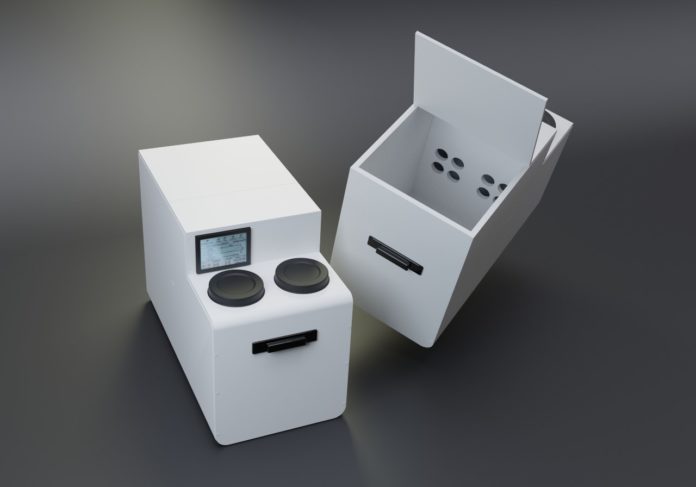By Crystal Mackay
Following a fatal car crash, a registered organ donor could save the lives of many patients critically awaiting heart, kidney, liver, lung or pancreas transplantation. Once doctors successfully remove vital organs, they are carefully placed in what are essentially beverage coolers in an attempt to synchronize temperature with the ice cubes also packed within.
These are simple organ storage and transportation systems that have seen little change since organ transplants started in the late 1960s. There has to be a better, more effective and safer approach to transport something so incredibly valuable to saving someone’s life. And now there is.
A team of researchers from Western University has designed, developed and constructed a new portable temperature regulating device, which can be used to transport a wide array of temperature-sensitive items including organs, vaccines and pharmaceuticals. This scalable device could also prove invaluable for the restaurant and retail grocery industries with a capacity to effectively deliver items from businesses-to-consumer – at target temperatures – for the entire food supply chain.
According to project lead Kamran Siddiqui, a Western Engineering professor, devices currently available in the market (with improper temperature-regulating technologies) can cause deterioration or loss of items, and may have a significant negative impact on human health.
“It is 2020 and yet we are still transporting vaccines and organs in devices using primitive cooling methods like ice packs or ice cubes, with no control,” said Siddiqui.
Traditional devices are built without controls and have difficulty sustaining a fixed temperature (hot or cold). The new device developed by Siddiqui and Steven Jevnikar, his former graduate student and research assistant at Lawson, can be controlled and maintained at a constant-set point temperature independent of the surrounding temperatures for an extended period of time. The device also has the capability to vary the temperature to different set points for different time durations during transportation. There is also no need for an external electrical source, and it can also be controlled and monitored remotely.
Dr. Alp Sener, a collaborator on the project, is an associate professor at Western’s Schulich School of Medicine & Dentistry and scientist at Lawson, and citywide Chair/Chief in Urology.
“Every day, we think about how to improve the lives of our patients,” said Dr. Sener, also a transplant surgeon in the Multi-Organ Transplant Program at London Health Sciences Centre. “Sometimes the answers to our challenges comes from thinking outside of the box, and in this case, a box is exactly what we needed for success.”
An expert in mechanical engineering, Siddiqui explains the new device uses ‘phase change materials’ to release and absorb sufficient energy during transport to provide appropriate levels of heating and cooling to the stored items to maintain the required temperature.
“The need for safe transportation has never been more evident than today as the global COVID-19 pandemic affects all of our lives. Our technology is very promising and has already attracted international interest,” said Siddiqui.
Temperature requirements for safe and effective vaccine transport are quite narrow, especially for COVID-19 vaccines currently under development around the world.
“Our device may be one of the only options available to meet the strict criteria for worldwide vaccine transport,” said Steven Jevnikar.
“It is truly exciting to participate in a project that has this much potential to finally change the current problems facing organ and vaccine transportation, using technology developed right here in London, that will help patients in Canada and globally,” said Dr. Anthony Jevnikar, professor at Schulich Medicine & Dentistry, scientist at Lawson and the co-director of the Multi-Organ Transplant Program.
“During these difficult times of the COVID-19 pandemic, it is crucial to invest in innovative intellectual properties like this device that play such a significant role in protecting people’s health,” said Tamer Mohamed, Business Development Manager, WORLDiscoveries, a technology transfer and business development partnership of Western, Robarts Research Institute and Lawson Health Research Institute.
The project arose from collaboration between Western Engineering, the Schulich School of Medicine and Dentistry, the Lawson Health Research Institute and the Multi-Organ Transplant Program. It is supported by NSERC grants, as well as WORLDiscoveries.
Crystal Mackay is the Sr. Media Relations Officer at Western University’s Schulich School of Medicine & Dentistry.


